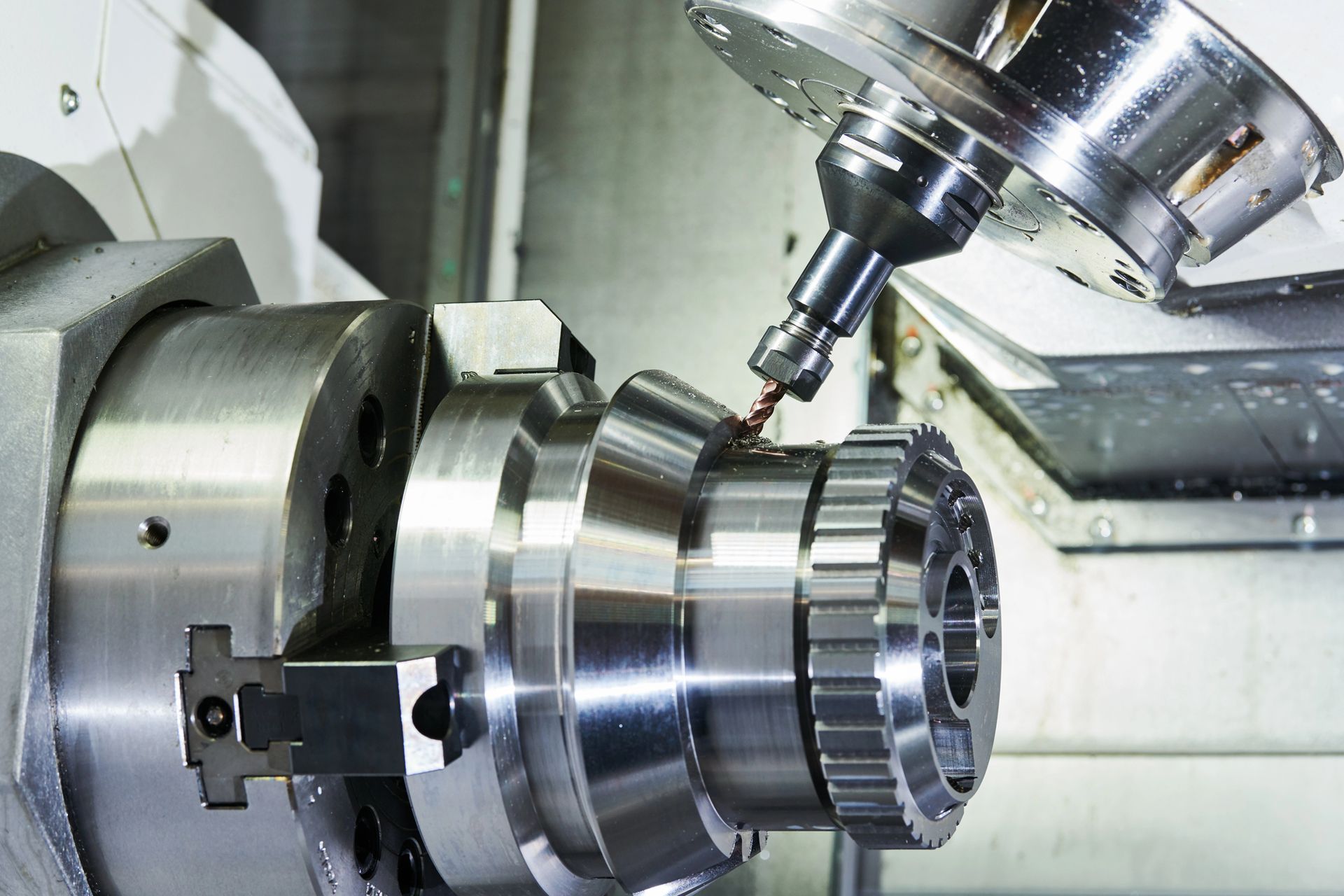The Role of CNC Machining in Aerospace Manufacturing
Aerospace manufacturing is an industry where precision and innovation are mission-critical. Every component, from turbine blades to fuselage frames, must meet the strictest standards due to the high-stakes nature of air travel.
Computer Numerical Control (CNC) machining has emerged as a vital technology in this sector, enabling the production of complex, high-quality aerospace components with the precision required for safety and performance.
Additionally,
CNC machining in aerospace enables rapid prototyping that can quickly turn into large-scale runs. Companies can test and implement new designs at scale without significantly changing production processes.
So, let’s explore the role of CNC machining in aerospace manufacturing, focusing on its contribution to precision, innovation, and industry advancement.

Understanding CNC Machining in Aerospace Manufacturing
CNC machining is used extensively in the aerospace industry for milling, turning, drilling, and grinding processes. These automated machines follow pre-programmed commands to manufacture components with high accuracy. Controlling multiple axes simultaneously allows CNC machines to create intricate geometries, which is essential for many aerospace components.
Aerospace parts often require tolerances of just a few microns, and CNC machines can consistently meet these exacting standards. Meeting these tolerances ensures that every component performs reliably under extreme conditions, ranging from the high pressure of jet engines to the structural demands of aircraft frames.
Additionally, the materials used in aerospace manufacturing are just as critical as the precision of the machining process. CNC machines often use high-strength materials like titanium, aluminum alloys, and composites.
These materials offer excellent strength-to-weight ratios but can be difficult to work with using traditional methods. CNC machining handles these challenges and enables the production of durable, lightweight parts that meet the industry's strict requirements.
Precision in Aerospace Manufacturing with CNC Machining
How can the aerospace industry benefit from the precision possible with CNC machining? Let’s explore why this specific capability is so valuable in aerospace.
Importance of Precision in Aerospace Components
Precision is not just a desirable attribute in aerospace; it’s a necessity. To ensure safety and performance, components like turbine blades, landing gear parts, and engine components must be manufactured to exact specifications. Even the slightest deviation from design tolerances can result in catastrophic failures.
For example, turbine blades must withstand immense heat and pressure, making accuracy in their production vital for both efficiency and longevity. Structural components also require tight tolerances to ensure the overall integrity of the aircraft.
CNC Machining Techniques for Achieving Precision
CNC machines achieve high precision through computer-controlled movements that minimize human error. These machines use advanced software to control their actions down to fractions of a millimeter, allowing for exact replications of part designs.
The repeatability of CNC machining is another significant advantage — manufacturers can produce thousands of identical parts with minimal variation. This is especially important in aerospace, where each part must perform reliably and consistently.
Meeting tight tolerances is essential for the performance and safety of aerospace parts. CNC machines maintain these tolerances using sophisticated sensors and feedback systems to make minute adjustments during machining. This ensures the machine produces parts with the required precision, even under changing conditions, such as temperature variations.
Quality Control and Inspection in CNC Machining
Quality control is just as important as precision during manufacturing in the aerospace industry. CNC machining incorporates advanced inspection techniques to ensure that parts meet exact specifications. One of the most widely used methods is Coordinate Measuring Machines (CMM), which measure the physical geometries of a part against its digital design.
By comparing the actual dimensions to the intended design, manufacturers can quickly identify and correct any discrepancies, ensuring that all parts meet the stringent requirements of the aerospace industry.
Innovation in Aerospace Manufacturing Through CNC Machining
CNC machining is a powerful technology that can aid innovations across the aerospace manufacturing industry. How does this manufacturing technology enable innovations in the industry? Let’s break down the key ways CNC machining contributes to advancing aerospace.
Advancements in CNC Technology
CNC technology is continually evolving, with recent advancements enabling more powerful capabilities in aerospace manufacturing. For instance, developing 5-axis CNC machines allows for producing more complex and intricate components in a single setup.
Unlike traditional 3-axis machines, 5-axis machines can move the cutting tool along five axes, providing the flexibility needed to create intricate geometries without repositioning the part multiple times. As a result, there are fewer errors and an overall efficiency gain throughout the manufacturing process.
9-axis CNC machines enhance these benefits while expanding what’s possible in a single run. Multi-tasking CNC machines, which combine multiple functions such as milling and turning in one setup, further enhance productivity.
Integration of CNC Machining with Automation and Robotics
The integration of CNC machining with automation and robotics is transforming aerospace manufacturing. Automation systems can load and unload parts, change tools, and monitor machine performance, freeing human operators to focus on more complex tasks.
CNC machines can be integrated with Internet of Things (IoT) devices and Artificial Intelligence (AI) platforms. These smart-systems collect real-time data on machine performance, material properties, and environmental conditions, enabling manufacturers to make informed decisions about process optimization.
In aerospace production, these systems allow for better control over the manufacturing process, ensuring consistent quality and reducing waste.
Role of CNC Machining in Developing New Aerospace Materials
CNC machining is pivotal in working with advanced materials like carbon composites and superalloys, as aerospace manufacturers push the boundaries of material science. These materials offer significant advantages in strength, weight, and durability but can often be difficult to machine.
CNC machining is driving innovation in designing and manufacturing lightweight, high-strength components by being capable of working with advanced materials. For example, developing lighter aircraft parts made from composites reduces fuel consumption and increases modern aircraft's range, contributing to cost savings and environmental sustainability.
The Future of CNC Machining in Aerospace Manufacturing
The future of CNC machining in aerospace manufacturing looks promising, with several emerging trends ready to enhance CNC’s capabilities further.
One exciting development is the integration of CNC machining with additive manufacturing, also known as 3D printing. By combining these two technologies, manufacturers can create parts with complex internal structures that would be impossible to produce with traditional methods alone.
Additionally, as AI advances, it will play an even greater role in CNC machining, allowing machines to learn from past performance and make real-time adjustments. This will further improve precision, reduce downtime, and enhance the overall efficiency of aerospace manufacturing.
As CNC technology continues to evolve, aerospace manufacturers will be able to produce higher-quality components more efficiently, helping them meet the growing demand for safer, more efficient aircraft.
Work with GN for High-Quality CNC Machining in Aerospace
CNC machining is vital in aerospace manufacturing, where precision, innovation, and efficiency are crucial for safety and lasting business growth. CNC machines have revolutionized the industry and continue to push the boundaries of what is possible, from producing high-precision components to driving technological advancements.
As new technologies like additive manufacturing and AI integration take hold, CNC machining will remain at the forefront of aerospace innovation, ensuring that the industry can confidently meet future challenges.
CNC machining offers the precision and flexibility needed to stay competitive in this high-demand industry. GN has years of experience manufacturing parts for the aerospace industry, and we’re ready to bring leading-edge CNC machining to your manufacturing processes.






